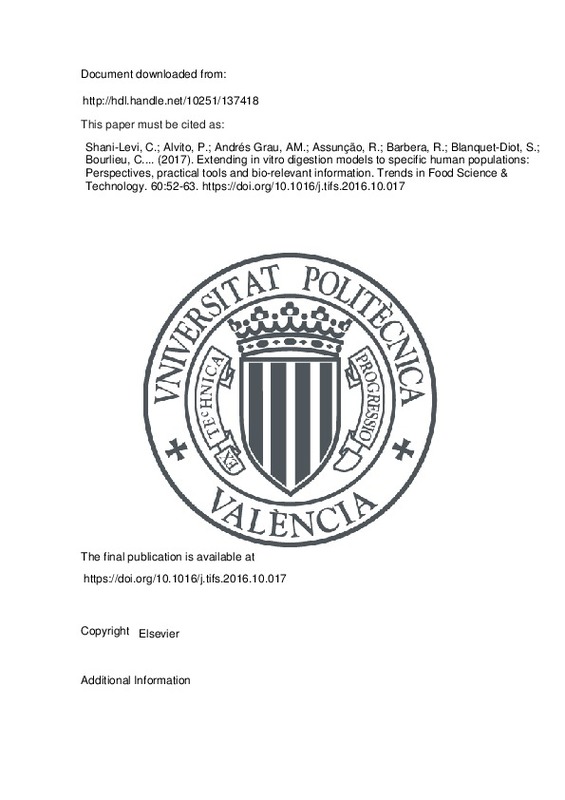JavaScript is disabled for your browser. Some features of this site may not work without it.
Buscar en RiuNet
Listar
Mi cuenta
Estadísticas
Ayuda RiuNet
Admin. UPV
Extending in vitro digestion models to specific human populations: Perspectives, practical tools and bio-relevant information
Mostrar el registro completo del ítem
Shani-Levi, C.; Alvito, P.; Andrés Grau, AM.; Assunção, R.; Barbera, R.; Blanquet-Diot, S.; Bourlieu, C.... (2017). Extending in vitro digestion models to specific human populations: Perspectives, practical tools and bio-relevant information. Trends in Food Science & Technology. 60:52-63. https://doi.org/10.1016/j.tifs.2016.10.017
Por favor, use este identificador para citar o enlazar este ítem: http://hdl.handle.net/10251/137418
Ficheros en el ítem
Metadatos del ítem
| Título: | Extending in vitro digestion models to specific human populations: Perspectives, practical tools and bio-relevant information | |
| Autor: | Shani-Levi, Carmit Alvito, Paula Assunção, Ricardo Barbera, Reyes Blanquet-Diot, Stephanie Bourlieu, Claire Brodkorb, Andre Cilla, Antonio Deglaire, Amelie Denis, Sylvain Dupont, Didier Karakaya, Sibel Giosafatto, Concetta Valeria Lucia Mariniello, Loredana Martins, Carla Menard, Olivia El, Sedef Nehir Vegarud, Gerd Elizabeth Ulleberg, Ellen Lesmes, Uri | |
| Entidad UPV: |
|
|
| Fecha difusión: |
|
|
| Resumen: |
[EN] Background
In vitro digestion models show great promise in facilitating the rationale design of foods. This paper provides a look into the current state of the art and outlines possible future paths for developments ...[+]
|
|
| Palabras clave: |
|
|
| Derechos de uso: | Reserva de todos los derechos | |
| Fuente: |
|
|
| DOI: |
|
|
| Editorial: |
|
|
| Versión del editor: | https://doi.org/10.1016/j.tifs.2016.10.017 | |
| Título del congreso: |
|
|
| Lugar del congreso: |
|
|
| Fecha congreso: |
|
|
| Tipo: |
|







![[Cerrado]](/themes/UPV/images/candado.png)


